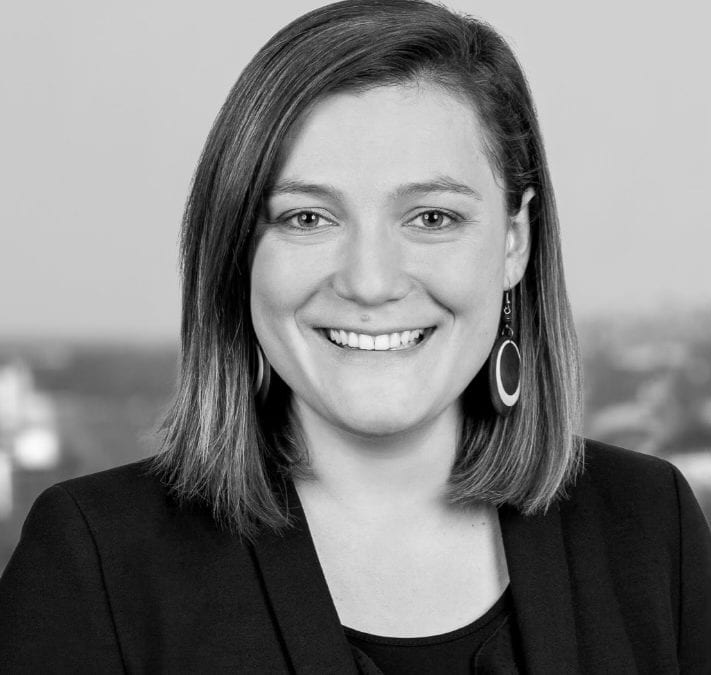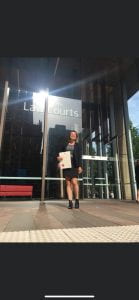Written by Julia Day
#UNELaw alumna Ali Pettit notes ‘there is no doubt the internet has transformed the way we live and interact. It has created legal issues which were unimaginable even a decade ago. That being said- the internet has also helped create positive societal change. It has allowed people to connect and communicate with others in a fast, effective and cost-efficient way. This has allowed alleged sexual abuse survivors to share their stories. Before this, a sexual abuse survivor likely assumed the abuse had only happened to them – there is never only one victim!!’
I had Ali as a student in Torts Law several years ago. Anyone who knows Ali would have quickly realised she is super smart, motivated and very personable! She is also an amazing horse woman and whilst studying she worked at the NEGS Equestrian Centre, where she was clearly widely respected and well liked…
Ali notes her #UNELaw degree has helped her immensely in her legal career. In particular, she notes- ‘the smaller class sizes and ability to get to know my lecturers helped me learn how to build professional relationships with others.’ It made my heart sing when she noted that I helped make her law school experience less intimidating as ‘you have a sense of realism about you!!’ She also mentioned the units she undertook with Dr Aileen Kennedy and Paul Akon as being stand outs. ‘I completed Medico-Legal Issues and Contracts with Aileen. Having someone like Aileen as a lecturer was fantastic!’ In addition, ‘completing Alternative Dispute Resolution (ADR) with Paul Akon was great. In my current career I engage in ADR all the time!!’
Ali also made life long friendships at UNE. In fact, she recently met up with UNE alumni -Emily Wilson, Eden Monique Hull and Lucinda Mulligan in Canberra! 
Immediately after Ali graduated from UNE she went overseas. She worked on a safari in Africa and completed work experience in New York. When she came back to Australia she started applying for jobs. She focused on the Canberra locality- she liked the fact Canberra is full of young professionals, whilst still being semi-rural in nature.
Ali quickly got a job offer from a law firm specialising in personal injury in Canberra and she hasn’t looked back since. Ali notes her most notable case was an action which was brought against Father Anthony Bongiorno and the Archdiocese of Melbourne. This case was settled once the Archdiocese of Melbourne offered a record $3 million settlement. Aside from this, Ali has acted for hundreds of survivors of institutional sexual abuse all across Australia.
As many of you will be aware, the legal issues in historical sexual abuse cases are complicated and varied. Finding vicarious liability can often be an issue. As sexual abuse is a criminal act it may be ‘beyond the scope of the perpetrator’s employment.’ In some cases, the relevant institutions note that the perpetrator was not ‘employed’ by them…’ Interestingly, the fact that the abuse took place is not usually in question. But evidential issues may come into play- especially given the length of time between the abuse and the action being brought.
Interestingly and disturbingly, Ali has noticed a distinct difference between survivors of institutional abuse from country towns as opposed to metropolitan cities. ‘Country towns seem to harbour shame and secrets like no other. Family identities and histories are embedded in the culture. It is seen as being shameful to have been subject to an assault committed by someone who may be greatly respected within the community. This causes more damage than you could ever imagine. Most people drink the effect of their abuse. They drink the shame, the pain and the memories away. Sadly, the local pub in these towns probably has more survivors of childhood sexual abuse than anywhere else.’
The other thing Ali has witnessed since working in this area is that abuse survivors don’t just come from one context or socio-economic level. Instead she meets clients from all works of life- they are just as likely to be CEOs or homeless people!! She also notes sex abusers have traditionally been very clever and cunning. ‘They were often a pillar of the community who built up relationships with the victim’s family and actively helped them. For example, the offender may have helped a single mum by driving her kids to school. This is a clever tactic as if someone is well known and helpful in a community, people will be less likely to speak out against them- especially in a smaller rural area.’
Ali has recently moved to Stacks Goudkamp where she has been tasked with growing the historic sexual abuse team. As would be expected, this area of law has been growing since the Royal Commission released their report. Ali notes ‘the Royal Commission into Institutional Responses to child sexual abuse uncovered the truth about how these institutions operated and preyed on the communities most vulnerable. This subject matter is hard, but seems to be even harder for a country community that is historically homophobic when the majority of survivors of institutional abuse are men. It is tough for anyone, but I have found connections remain strong in these communities and coming to terms and getting help for what happened can seem impossible.’
Ali clearly loves her job, but undertaking this kind of work is obviously stressful. I asked Ali about how she deals with this and she noted ‘I ride my horse ‘Donkey’ to clear my head. When riding horses, you need to communicate with them- I can’t think about work when I am riding ‘Donkey!’
Congratulations Ali on your success and thank you for undertaking such important work!




